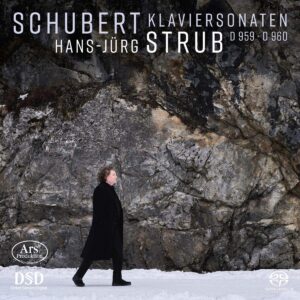Although I’ve known about Hans-Jürg Strub’s highly regarded reputation as a piano pedagogue, I actually had not heard him play until the present release crossed my reviewer’s desk. Schubert’s A major D. 959 sonata attests to this pianist’s powers of projection, legato mastery, and all-around seriousness of purpose. Yet his frequent ritards in the first movement grow more predictable as the music transpires and undermine Schubert’s sense of harmonic surprise, as in the second subject’s sudden shift from major to minor mode. Contrast this to Maurizio Pollini’s faster basic tempo and subtle modifications of pulse that propel the movement to more sweeping, dramatic, and gratifying effect. However, one must credit Strub’s care in voicing the development section’s close-lying imitative lines.
Strub shapes the Andantino’s outer sections with eloquent simplicity, yet his cool and steady dispatch of the central episode doesn’t allow the wild chromatic runs or recitative-like passages their tumultuous and tragic due; put on Krystian Zimerman’s DG recording and you’re transported to another world. The Scherzo is appreciably light and playful, yet again the pianist’s ritards soften the impact of the fortissimo descending scales, in marked contrast to the headlong drama of Alfred Brendel’s digital studio remake. But Strub’s Rondo gains fluidity and warmth as it unfolds.
As with many pianists bent on making a personal statement in the B-flat sonata’s long first movement, Strub’s expressive emendations, though fascinating in and of themselves, often seem picky and episodic, obscuring the proverbial bigger picture. To cite one example, Strub’s tempo gearshifts at the outset of the exposition’s first ending promise something dramatic, yet the pianist winds up holding back at the final low-register trill, and the anticipated shattering climax goes for naught.
Strub’s singing tone truly resonates in the slow movement, although Leon Fleisher’s suppler control of foreground and background textures better illuminates the composer’s sublime harmonic twists and turns. The concluding Rondo is well-controlled, but the dotted chords in the minor-key section lack Sviatoslav Richter’s incisive ferocity. However, Strub’s Scherzo is one of the finest on disc; it’s lithe and lilting, packed with perky accents and colorful turns of phrase. He gives just enough emphasis to the Trio section’s syncopated bass notes without unduly stressing them. For what it’s worth, the A major sonata’s Rondo and B-flat sonata’s Scherzo are keepers, and I also should mention the first-class annotations and sonics.
































